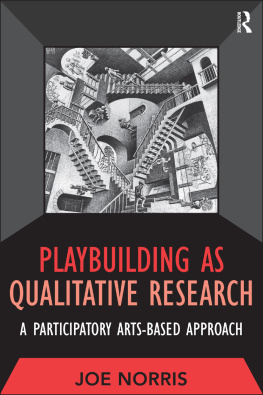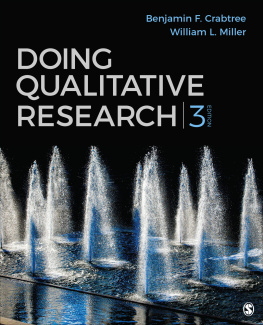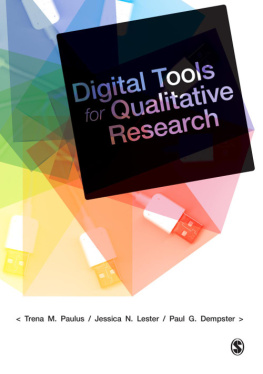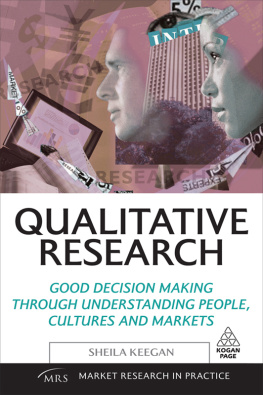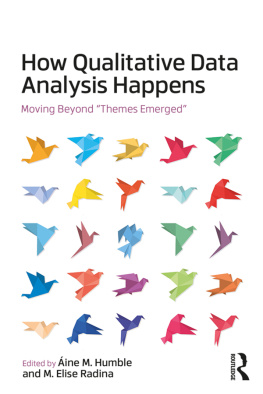PLAYBUILDING AS QUALITATIVE RESEARCH
Developing Qualitative Inquiry
Series Editor: Janice Morse
University of Utah
Books in the new Developing Qualitative Inquiry series, written by leaders in qualitative inquiry, will address important topics in qualitative methods. Targeted to a broad multidisciplinary readership, the books are intended for mid-level/advanced researchers and advanced students. The series will advance the field of qualitative inquiry by describing new methods or by developing particular aspects of established methods.
Series Editorial Board: H. Russell Bernard, Kathy Charmaz, D. Jean Clandinin, Juliet Corbin, Carmen de la Cuesta, John Engel, Sue E. Estroff, Jane Gilgun, Jeffrey C. Johnson, Carl Mitcham, Katja Mruck, Judith Preissle, Jean J. Schensul, Sally Thorne, John van Maanen, Max van Manen
Volumes in this series:
Autoethnography as Method, Heewon Chang
Interpretive Description, Sally Thorne
Developing Grounded Theory: The Second Generation, Janice M. Morse, Phyllis Noerager Stern, Juliet Corbin, Barbara Bowers, Kathy Charmaz, and Adele E. Clarke
Mixed Method Design: Principles and Procedures, Janice M. Morse and Linda Niehaus
Playbuilding as Qualitative Research: A Participatory Arts-Based Approach, Joe Norris
Poetry as Method: Reporting Research through Verse, Sandra L. Faulkner
PLAYBUILDING AS QUALITATIVE RESEARCH
A Participatory Arts-Based Approach
Joe Norris
Brock University
First published 2009 by Left Coast Press, Inc.
Published 2016 by Routledge
2 Park Square, Milton Park, Abingdon, Oxon OX14 4RN
711 Third Avenue, New York, NY 10017, USA
Routledge is an imprint of the Taylor & Francis Group, an informa business
Copyright 2009 Taylor & Francis
All rights reserved. No part of this book may be reprinted or reproduced or utilised in any form or by any electronic, mechanical, or other means, now known or hereafter invented, including photocopying and recording, or in any information storage or retrieval system, without permission in writing from the publishers.
Notice:
Product or corporate names may be trademarks or registered trademarks, and are used only for identification and explanation without intent to infringe.
Library of Congress Cataloguing-in-Publication Data:
Norris, Joe.
Playbuilding as qualitative research: a participatory arts-based approach / Joe Norris.
p. cm.(Developing qualitative inquiry)
Includes bibliographical references and index.
ISBN 978-1-59874-476-7 (alk. paper)ISBN 978-1-59874-477-4 (pbk. : alk. paper)
1. Improvisation (Acting) 2. PlaywritingStudy and teaching. I. Title.
PN2071.I5N67 2009
792.072dc22
2009033491
Performance rights to the scripts contained within must be obtained from Mirror Theatre. Contact the author, who will assemble the Board to grant performance rights.
ISBN 978-1-59874-476-7 hardcover
ISBN 978-1-59874-477-4 paperback
Dedication
To my wife, Pauline, and my daughters, Carmen and Jessica, who best taught me how to live playfully and responsibly in community with others.
To my students and A/R/Tors, who have shared part of this journey of trying to understand and to improve the human condition.
To audiences, who have joined the casts of Mirror Theatre in our quest. Their insights on both the substance of our work and the theatrical forms used have taught us as much as we have taught them.
This book is written for researchers who wish to use the dramatic arts in any or all stages of their research (arts-based research) and for artists who use empirical data as a source of inspiration (research-informed arts). As such, it is an interdisciplinary text merging two genres of interpretation and portrayal. For the practicing researcher, through narrative and discussion, the book aims to open up a myriad of possibilities that are commonplace to a performing artist and playwright. For the practicing artist, the stories of devising scenes demonstrate how personal stories and the stories of others can be translated into a variety of dramatic media, and how one may gather information to guide ones work by focusing on a specific theatrical genre, known in Canada as Collective Creation (Berry and Reinbold, 1985; Filewod, 1987; Salutin and Theatre Passe Muraille, 1976) or Playbuilding (Bray, 1991; Weigler, 2002), a more generic term. The book highlights a genre of arts-based research. I hope that it will provide insights to all researchers and inform the practices of those in the visual and performing arts.
The book is about participation. A collaborative process inspired the scenes highlighted by the 11 middle chapters. Actors/researchers/teachers (A/R/Tors) generated data on chosen topics, told stories, and created and compiled scenes that were representative of their disparate and sometimes conflicting collective voices. The projects included many who were interested in a particular topic and/or participatory forms of dramatic representation. The scenes evolved through a rigorous process in which small working groups devised vignettes with the entire cast providing feedback and ultimately chose what scenes to include. The participants acted as researchers, playwrights, and performers and were involved in the research endeavor from data generation through to data presentation.
Audience members, too, became involved in data generation and interpretation of the topic under investigation, be it be bullying, addictions, human sexuality, the power differentials in teaching and learning, prejudice, or even qualitative research. They were asked to identify what they determined to be the central issues in scenes, to suggest courses of action, to provide the gathering with stories that they wished to share, and to dramatically explore all these as well. The performed scenes were created as evocative texts (Barone, 1990), not meant to didactically conclude or shut down the conversation (Smith and Heshusius, 1986) but to open it up, inviting other points of view. Hence, the research product was written to be fluid in nature, in anticipation of a readers response (Rosenblatt, 1978). The consumers of the research re-informed it in a dialogic process.
The book is about epistemology. Through exemplars and discussion it challenges and extends the debate on how knowledge is defined, replacing the term data collection with data generation. It questions the concept of analysis, emphasizing the interplay between an event and ones internal processing. Data then is not interpreted but mediated, as both the knower and the knowing change (Heisenberg, 1927, 1983). Finally, through the acknowledgment that all research is a constructed narrative (Richardson, 1990), it advocates and celebrates the mediation of raw material into poetic (Butler-Kisber, 2002), artistic (Irwin and de Cosson, 2004), and fictionalized texts (Banks and Banks, 1998; Dunlop, 2002).

